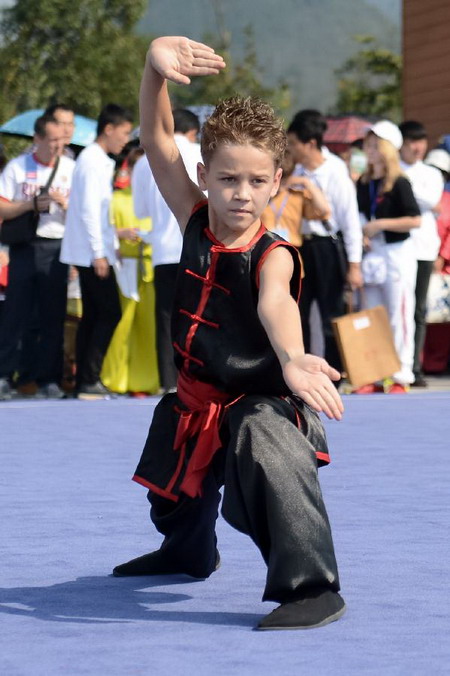 |
|
A small foreign player participates in the traditional Chinese boxing competition on Oct. 26. [Photo/Xinhuanet]
|
The 6th World Wushu Championships came to a close in Chizhou city, Anhui province on Oct. 28. The three-day competition attracted more than 2,000 Wushu players from 45 countries. The Chinese Wushu Association, Russian team and Brazilian team ranked at the top on the gold medal list.
Wu Tingui, executive vice president of the International Wushu Federation, said in an interview that though Wushu, or martial art, had gained much more popularity that it did 10 years ago, there was still a long way to go in its normalization compared with Taekwondo and Karate.
The International Wushu Federation has taken in members from 149 countries and regions and held Wushu tournaments on a continental level on five continents. Wushu was accepted as the demonstration sport for the 2017 Taipei World University Games and also as the alternative sport of the 2016 Rio Olympics.
According to Wu Tinggui, Wushu has gone through three phases in its development: in the 1970s and 1980s, the kung fu movies starred by Bruce Lee, Jackie Chan and Jet Lee were all the rage; after the 1980s, the increasing number of Chinese emigrants into North America and Southeast Asia led to the prevalence of Nanquan (Southern Fist) and Tai Chi in those areas; since the 1990s, as many Wushu players and coaches went abroad to take part in competitions or open Wushu schools, Wushu has been accepted by more and more people.
Despite its great progress, Wushu has not come to its mature phase yet. “Wushu has not become popular in Africa and South America. We are trying to hold more events and develop more coaches and referee in these areas so that Wushu will have a balanced development all over the world,” said Wu Tinggui.
The internal reform and development of Wushu itself is also an urgent issue, with the fact that Wushu competition rules can not be quantified as the biggest concern. To solve this problem, the International Wushu Federation has been intensifying the training of international referees, with more and more people obtaining the international referee certification each year.
In addition, the lack of commercial elements is also one of the factors that restrict the self-development of Wushu. Very few commercials can be seen on the competition venues, and the coverage of television relay and audience ratings of Wushu competitions are far behind those of Taekwondo and Karate competitions.
